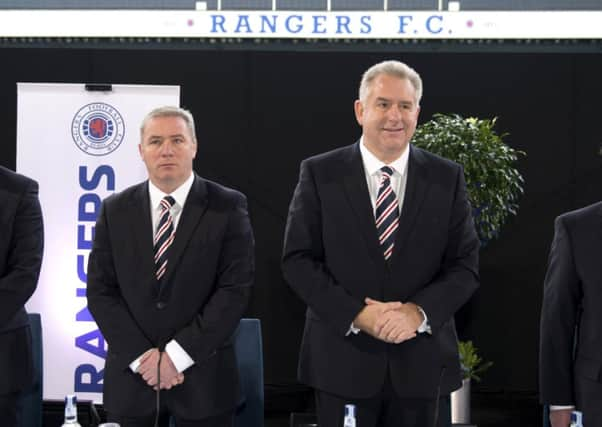Stuart Bathgate: Rangers saviours wanted


Instead, there was just a dispassionate announcement. Brian Stockbridge, the focus of outrage and discontent for many Rangers supporters, had resigned as a directorof the club.
“No ex gratia benefit or bonus” had been paid to the finance director, according to Rangers’ statement. He had received his annual salary, but that was it. A clean break. No loose ends or lingering uncertainties. A problem sorted.
Advertisement
Hide AdAdvertisement
Hide AdGranted, Stockbridge, for all that he had become an object of such widespread execration, was no more than a small problem. Rangers’ difficulties did not begin with his arrival in June 2012, nor have they evaporated with his departure 19 months later. Nonetheless, his disposal still represents a move in the right direction – towards a healthier, more efficiently run club which can be trusted by its supporters. And, perhaps more significantly, it is an example of the modus operandi which is steadily garnering respect for chief executive Graham Wallace.
These are early days for Wallace, who was only appointed in November. Given what has gone on before him, some continued scepticism is understandable when it comes to assessing his ability to sort Rangers out. But so far, he has gone about his unenviable task calmly and efficiently, which may just be exactly what is needed. As no-one needs reminding, incalculable quantities of emotive bluster have been expended about the stricken club over the past couple of years. Some agonised outbursts have been wholly understandable: in the cases of people with genuine, long-term attachments to the club, you can appreciate why they should be driven to distraction by what has gone on.
In other cases, the bombast may have been less sincere. Charles Green, for one, appeared ready enough to make the right noises about Rangers in a bid to get the fans on his side, and somewhat less prepared to go about his job with unimpeachable transparency. Dave King, while having an attachment to Rangers far more enduring than Green’s, is another case.
As Tom English spelled out in Scotland On Sunday yesterday, the ostensible saviour of the club has been long on rhetoric, short on hard cash. And, at this stage of proceedings, coming on two years since Craig Whyte took Rangers into administration, there is no need for any more bombast. What there is a need for is clarity, and calmness, and a cool, detached determination to get things done.
Imagine Rangers as a patient, lying in the operating theatre a couple of miles down the road at the Southern General. Green would be inside the room, bragging about how he had grown to love this stricken individual – and doing nothing effective about it. King would be somewhere further away, possibly even thousands of miles away, insisting that something had to be done to get this fallen giant back on his feet – and doing nothing effective about it.
And Wallace? Maybe, just maybe, we can envisage him as the surgeon who has examined the case in cold blood, settled on a prognosis, and is now carrying out a course of action that he is sure will be effective. And maybe – albeit at the risk of hyperextending this medical metaphor – we can envisage two of Wallace’s colleagues there too, playing their part in an operation designed to end in the restoration of rude health.
Consultant Philip Nash should shortly be confirmed as Rangers’ financial director in place of Stockbridge, and has a track record at Liverpool and Arsenal that should at least inspire a little more confidence than his potential predecessor. Chairman David Somers has a similarly solid background, and has so far demonstrated exactly the kind of independence that the role demands.
It was possibly difficult last month to take every word of Somers’ statement literally when he claimed that, until joining the board in November, he had “never heard of Charles Green, Imran Ahmad, Craig Whyte, or any of the other characters in Rangers’ history”. More important, though, were the two sentences that followed: “To my knowledge, I have never met them, nor had business dealings with them. Nor would I recognise them if I passed them on a street.”
Advertisement
Hide AdAdvertisement
Hide AdBut in any case, by claiming ignorance of Green and those others whom he euphemistically described as “characters”, Somers made a couple of useful points. Not only did he have no link with those discredited figures, he had no interest in finding out about them. He was not concerned with the past, and had arrived at Ibrox with no baggage, either good or bad, relating to what had gone before.
He had arrived to do a job. A job that did not entail any previous emotional commitment, real or merely feigned, to Rangers. Like the way in which Wallace dealt with Stockbridge, Somers’ statement was a good example of the dispassionate attitude being brought to bear at Ibrox. It is an attitude that is no more than basic, decent business practice, but has nonetheless been conspicuous by its absence from the club for too long.
What is more, it probably has its roots in the assessment that many neutral observers of Rangers would make. To those who can remain impartial, neither desperate for a rapid resurrection nor hopeful of a continued decline, there has been one central question about Rangers ever since the club went into administration nearly two years ago. That is, not if they will ever recover from their financial woes, but how long it will take.
Given the size of the support base, eventual recovery appears certain. The timing will be variable, depending on how soundly or otherwise Ibrox is run. Without full knowledge of the state of the club’s finances, we cannot be certain, but at least judging by the way in which Wallace and his key colleagues are going about their business, it now looks like that recovery will be completed sooner rather than later.
SEE ALSO